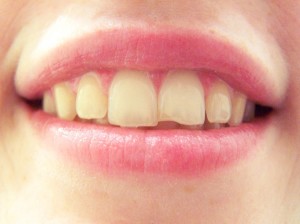
Chipped teeth are so common that it’s nearly impossible to estimate how many people in America have them.  However, the list of common habits that lead to chipped teeth is extensive and include everything from chewing on ice, biting through things that aren’t food (like plastic tags on clothing), failing to wear a mouthguard while playing sports, and crunching on unpopped kernels of popcorn. Chipped teeth can do more than detract from the symmetry and attractiveness of your smile; it can lead to even more serious oral health problems. Luckily, your cosmetic dentist has several treatment options to correct a chipped tooth.
However, the list of common habits that lead to chipped teeth is extensive and include everything from chewing on ice, biting through things that aren’t food (like plastic tags on clothing), failing to wear a mouthguard while playing sports, and crunching on unpopped kernels of popcorn. Chipped teeth can do more than detract from the symmetry and attractiveness of your smile; it can lead to even more serious oral health problems. Luckily, your cosmetic dentist has several treatment options to correct a chipped tooth.
The most obvious reason for correcting a chipped tooth is as plain as the teeth in your smile. A chipped tooth can project an unhealthy, unprofessional image and can spoil an otherwise attractive smile.
In a non-cosmetic sense, a chipped tooth is a damaged tooth. Even though that chip might be minor, it still weakens the structure of the tooth. Left untreated, that chip can get larger, ending up in need of more extensive repair. In addition, chipped teeth that have a sharp edge can end up cutting the tongue, cheeks, and lips.
Cosmetic bonding offers and easy, conservative, and inexpensive treatments for chipped teeth. During this procedure, which generally takes less than an hour to complete, your cosmetic dentist applies dental resin to the chipped area and, once it cures, utilizes several sculpting and polishing tools to reshape the bonded tooth. A quick polish and your newly bonded tooth looks like new!
While bonding is the most convenient chipped tooth treatment, some patients prefer a longer lasting and more comprehensive treatment. With porcelain veneers, you can have a completely protected and repaired tooth in as little as two visits. Veneers are custom-crafted from dental porcelain and cover the entire front surface of the tooth (as opposed to bonding). Although porcelain is fragile on its own, it becomes incredibly strong and durable when bonded to a sturdy structure like a tooth.